| Srl | Item |
| 1 |
ID:
193483
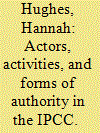

|
|
|
|
|
| Summary/Abstract |
Scholarship on global environmental assessments call for these organisations to become more reflexive to address challenges around participation, inclusivity of perspectives, and responsivity to the policy domains they inform. However, there has been less call for reflexivity in IPCC scholarship or closer examination of how routine concepts condition scholarly understanding by focusing on science and politics over other social dynamics. In this article, I suggest that scholarly reflexivity could advance new analytical approaches that provide practical insights for changing organisational structures. Through reflecting on my understanding of the IPCC, I develop actors, activities, and forms of authority as a new analytical framework for studying international organisations and knowledge bodies. Through its application, I describe the social order of the IPCC within and between the panel, the bureau, the technical support units, the secretariat and the authors, which is revealing of which actors, on the basis of what authority, have symbolic power over the writing of climate change. The fine-grained analysis of organisations enabled by this analytical framework reveals how dominance can and is being remade through intergovernmental relations and potentially, identifies avenues that managers of these bodies can pursue to challenge it.
|
|
|
|
|
|
|
|
|
|
|
|
|
|
|
|
| 2 |
ID:
146469
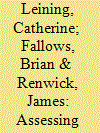

|
|
|
| 3 |
ID:
111770
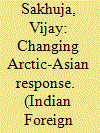

|
|
|
| 4 |
ID:
141249
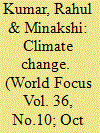

|
|
|
|
|
| Summary/Abstract |
The issue of climate change is one of the most vehemently debated topics in the national and international domain and it has its impact in almost all sectors of human existence, be it on health, economy, and environment and so on. According to United Nations Framework Convention on Climate Change (UNFCCC), change in climate is in one way or the other linked with human activity. It defines climate change as the change that can be attributed “directly or indirectly to human activity that alters the composition of the global atmosphere and which is in addition to natural climate variability observed over comparable time periods” A slightly different approach is adopted while defining climate change by Intergovernmental Panel on Climate Change (IPCC). IPCC has defined climate change as “change in the state of the climate that can be identified by changes in the mean and/or the variability of its properties, and that persists for an extended period, typically decades or longer. It refers to any change in climate over time, whether due to natural variability or as a result of human activity.
|
|
|
|
|
|
|
|
|
|
|
|
|
|
|
|
| 5 |
ID:
118272
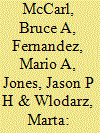

|
|
|
|
|
| Publication |
2013.
|
| Summary/Abstract |
The dual forces of population growth and climate change will exacerbate pressures on land use, water access, and food security.
|
|
|
|
|
|
|
|
|
|
|
|
|
|
|
|
| 6 |
ID:
138904
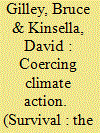

|
|
|
|
|
| Summary/Abstract |
At UN-sponsored climate talks in 2013, the Group of 77 (G77) developing countries, joined by China, walked out briefly in protest against the failure of rich countries to provide a ‘loss-and-damage mechanism’ that would compensate poor countries for the detrimental effects of climate change. At the same conference, Japan’s announcement that it would not meet its emissions goals brought widespread condemnation. These events reflected an intensification of the most persistent deadlock in climate negotiations since the UN Framework Convention on Climate Change (UNFCCC) was agreed in 1992.
|
|
|
|
|
|
|
|
|
|
|
|
|
|
|
|
| 7 |
ID:
123817
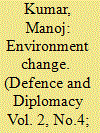

|
|
|
| 8 |
ID:
127523
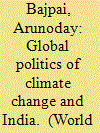

|
|
|
| 9 |
ID:
127525
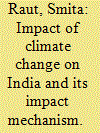

|
|
|
| 10 |
ID:
176779
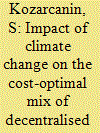

|
|
|
|
|
| Summary/Abstract |
Residential demands for space heating and hot water account for 31% of the total European energy demand. Space heating is highly dependent on ambient conditions and susceptible to climate change. We adopt a techno-economic standpoint and assess the impact of climate change on decentralised heating demand and the cost-optimal mix of heat pump and gas boiler technologies. Temperature data with high spatial resolution from nine climate models implementing three Representative Concentration Pathways from IPCC are used to estimate climate induced changes in the European demand side for heating. The demand side is modelled by the proxy of heating-degree days. The supply side is modelled by using a screening curve approach to the economics of heat generation. We find that space heating demand decreases by about 16%, 24% and 42% in low, intermediate and extreme global warming scenarios. When considering historic weather data, we find a heterogeneous mix of technologies are cost-optimal, depending on the heating load factor (number of full-load hours per year). Increasing ambient temperatures toward the end-century improve the economic performance of heat pumps in all concentration pathways. Cost optimal technologies broadly correspond to heat markets and policies in Europe, with some exceptions.
|
|
|
|
|
|
|
|
|
|
|
|
|
|
|
|
| 11 |
ID:
127517
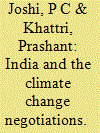

|
|
|
| 12 |
ID:
116037
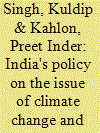

|
|
|
| 13 |
ID:
118242
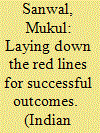

|
|
|
| 14 |
ID:
118150
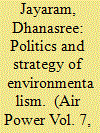

|
|
|
| 15 |
ID:
138552
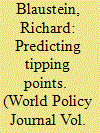

|
|
|
|
|
| Summary/Abstract |
At the time he attended the 2004 European Open Science Forum in Stockholm, German physicist Hans Joachim Schellnhuber had been speaking out publicly since the late 1990s about climate change impacting what he termed “the Achilles heels of the Earth system.” Using science-speak, he talked of “switch-and-choke points” and “large scale discontinuities” to describe the possibility that key natural systems whose stability we take for granted—like the Atlantic Ocean’s jet stream and a mechanism called the thermohaline circulation, which circulates warm water globally—could abruptly change under climate change stress.
|
|
|
|
|
|
|
|
|
|
|
|
|
|
|
|
| 16 |
ID:
129941
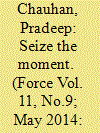

|
|
|
| 17 |
ID:
109860
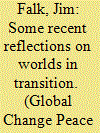

|
|
|
| 18 |
ID:
140043
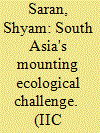

|
|
|
| 19 |
ID:
178654


|
|
|
|
|
| Summary/Abstract |
Warning about dire effects of climate change on armed conflict is a recent variation of a scenario that has been promoted by environmental pessimists for over two centuries. The essence is that human activities lead to resource scarcities that in turn will generate famine, pestilence, and war. This essay reviews three stages of the argument: first, the original Malthusian thesis that focused on food production. Second, the broader neoMalthusian concern from the 1970s about limits to growth and developing scarcities in a range of necessities. And recently, the specter of climate change. In each phase, the Malthusians have met firm opposition from environmental optimists, who argue that emerging scarcities can be countered by human ingenuity, technological progress, and national and international economic and political institutions and that environmental change is not in itself a major driver of human violence. In the third phase, the Malthusian case appears to be stronger because human activities have reached a level where they have a truly global impact. Environmental optimists still insist that these problems can be overcome by human ingenuity and that the long-term trend towards less violence in human affairs is unlikely to be reversed by climate change. The stakes seem higher, but the structure of the debate remains largely the same.
|
|
|
|
|
|
|
|
|
|
|
|
|
|
|
|
| 20 |
ID:
100454
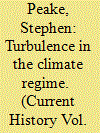

|
|
|
|
|
| Publication |
2010.
|
| Summary/Abstract |
The ongoing shift in the distribution of global financial power could come just in time to revitalize the IMF and other major international financial institutions.
|
|
|
|
|
|
|
|
|
|
|
|
|
|
|
|